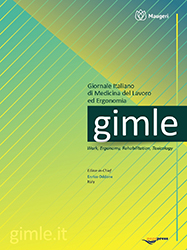LEAN, WORK AND PSYCHOLOGICAL WELL-BEING
All claims expressed in this article are solely those of the authors and do not necessarily represent those of their affiliated organizations, or those of the publisher, the editors and the reviewers. Any product that may be evaluated in this article or claim that may be made by its manufacturer is not guaranteed or endorsed by the publisher.
Authors
Many studies have confirmed the existence of a close relationship between job satisfaction and health. The Siena University Hospital introduced the Lean approach to support personnel development / empowerment and promote a constant improvement in work organization, with the aim of creating value for patients, professionals and the whole organization. The purpose of this study was to examine whether the introduction and the development of this improvement approach in healthcare could contribute to the enhancement of psychological wellbeing and employee satisfaction, with a positive value in preventing related stress work.
The Lyne & Barrett Employee Wellbeing Questionnaire (EWQ) was administered to employees involved in selected Lean projects carried out at the Siena University Hospital. The EWe is composed of 59 items and it is structured in three areas: organizational wellbeing, working satisfaction and workload. The analysis of the results showed significant evidence of the impact of improvement activities on the working satisfaction and the workload.
How to Cite

This work is licensed under a Creative Commons Attribution-NonCommercial 4.0 International License.
PAGEPress has chosen to apply the Creative Commons Attribution NonCommercial 4.0 International License (CC BY-NC 4.0) to all manuscripts to be published.






